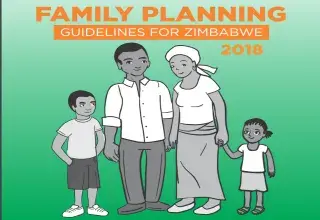By Dr. Esther Muia*
Harare, Zimbabwe, 11 July, 2018 - Today we commemorate World Population Day. This day has been commemorated globally each year since 1989. It’s a day that focuses our attention on the importance of population issues and is therefore quite central to our work as the United Nations Population Fund (UNFPA). The theme for this year’s commemorations is "Family Planning is a Human Right." As UNFPA, the lead agency on Sexual Reproductive Health and Rights, the provision of Family planning is quite key to our mandate.
Family Planning is a Human Right
This year marks the 50th anniversary of the 1968 International Conference on Human Rights, where family planning was, for the first time, globally affirmed to be a human right. The proclamation states that "Parents have a basic human right to determine freely and responsibly the number and spacing of their children." Family planning is therefore not about limiting couples but allowing couples the choice on when to have children, the number and how to space them. Family planning is essential to overcoming poverty, which worsens when individuals cannot choose the size of their family. There is overwhelming evidence suggesting that family planning can be a development strategy for improving health and wellbeing while reducing poverty and empowering women
Family planning is about choice
In order to ensure women/men exercise this right it is important for there to be a variety of choice for Family Planning. Family planning is human right which empowers women and girls and helps save lives. Pregnancy should be by choice and not by chance. Today, we still have areas with limited access to Family Planning information and services, particularly for young girls and for those in remote areas. This is of great concern particularly in the context of the high teenage pregnancies (1 in 3 girls below 18), which cut short these girls’ productive lives. On the continent, Zimbabwe has one of the highest Contraceptive Prevalence Rates (CPR) at 67%, according to the 2015 ZDHS but we should not be complacent. There is still need to bridge the unmet need. We need to look closely at expanding contraceptive choice for all.
Family Planning saves women’s lives
Family Planning is a key pillar to ensure safe motherhood. Access to information and services enables women and men the voluntary ability to space births, benefiting the mothers’ and children’s health and the community as a whole. It also reduces the risk of death and disability associated with from pregnancy and childbirth too early or too late in a woman’s life as is the situation in Zimbabwe. Women who have fewer risky births, healthier pregnancies and safer deliveries have lower risks of death and improved overall health. These improvements produce economic benefits: greater investments in schooling, greater productivity, greater labor force participation and, eventually, increased income, savings, investment and asset accumulation. Family planning information and services provide an opportunity for women to be screened for other reproductive morbidities including Sexually Transmitted Infections as well as HIV; and even more importantly HPV and cervical cancer, breast cancer and other reproductive tract cancers.
Family Planning empowers young people
More than two thirds of Zimbabwe’s population are young people. Approximately 1 in 10 adolescent girls between the age of 15-19 years give birth each year, according to the ZDHS 2015. Pregnancy and childbirth related complications are the number-one killers of girls aged 15 to 19. Some of these girls are married whilst most are not. They all require more information and services to manage their reproductive lives. This information and services will also protect young people’s lives. The more information they have, the better choices they can make to be able to fulfil their futures. We need to invest more in our young people to have a brighter Zimbabwe and Family Planning can help us do this.
Family Planning is an empowerment tool for women
When a woman can plan her family, she can plan her life and be more productive. She can pursue more education, seek and keep better jobs, and contribute more to her family, community and the nation as a whole. As she becomes better-off financially, her children receive better education, and the benefits carry over well into future generations cutting the cycle of poverty while advancing the rights of women.
Male involvement is key
At the moment, the responsibility of family planning largely lies with the women. However, for successful families, it is important to ensure the participation of men in promoting as well as the utilization of Family Planning services. Men need to be encouraged to plan their families together with their spouses/ partners. In Zimbabwe, for Family Planning to be successful, men need to be engaged.
Support to Family Planning in Zimbabwe
With that background you will see that as UNFPA provision of Family Planning is very key to our mandate; its about saving the lives of women and empowering young people. UNFPA, through various funding partners, has been supporting the Government of Zimbabwe through the Zimbabwe National Family Council and Ministry of Health and Child Care to ensure access to family planning information and services. However, there is still a lot more that we can do to end unmet need for family planning and increase access for the most vulnerable. In conclusion let me say that as UNFPA we are fully committed to promoting the use of family planning to ensure ZERO unmet need for Family Planning and ZERO maternal deaths.
Dr. Esther Muia is a medical doctor by profession and Country Representative for UNFPA, Zimbabwe country office. She is a strong advocate for women’s health and young people’s development. This article was published in Zimbabwe's mainstream newspapers The Herald, Daily News and NewsDay



